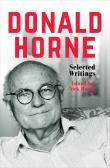AustLit
Latest Issues
AbstractHistoryArchive Description
'One of Australia’s leading thinkers for close to fifty years, Donald Horne was probably the best Australian non-fiction writer of his generation.
'This definitive collection of Horne’s writing, thoughtfully selected by his son, Nick, tells the story of his life and intellectual development. From a position of doubting whether change was possible, he eventually became a proponent of the sensible reform necessary for Australia to prosper in a changing world.
'Horne made the case for a more open, modern, intelligent Australia, most famously in his seminal book The Lucky Country. Selections from this work sit alongside pithy reflections on Australian history and culture, as well as vivid autobiographical writing.
'With an introduction by Nick Horne and a biographical essay by Glyn Davis , this important book honours and illuminates the man who helped the nation understand itself.' (Publication summary)
Contents
-
A Public Intellectual : The Life and Times of Donald Horne,
single work
essay
biography
(p. ix-xlix)
'Australia is a lucky country run mainly by second-rate people who share its luck. It lives on other peoples ideas, and, although its ordinary people are adaptable, most of its leaders (in all fields) so lack curiosity about the events that surround then that they are often taken by surprise.'
'This tough minded verdict by Donald Horne, central to The Lucky Country, lost its force over time. Speech-makers quote the tagline but not the stinging judgement it introduced. Shorn of irony, criticism became affirmation.' (Introduction)
Publication Details of Only Known VersionEarliest 2 Known Versions of
Works about this Work
-
Man of the Moment
2017
single work
review
— Appears in: Inside Story , July 2017;
— Review of Donald Horne : Selected Writings 2017 selected work essay -
On a Quest for National Values
2017
single work
review
essay
— Appears in: The Weekend Australian , 12 August 2017; (p. 18)'Even for a 17-year-old upstart from Muswellbrook, the diary entry was a stunning declaration of intent: ‘‘Friday, 7th January 1938. It is my desire to do great things, but I have not yet decided what great things … if I write I want to write literature. I want to write for Australian literature too.” The desire for greatness was just as startling as the clarity of its direction. From the earliest moments of his writing life, Donald Horne’s literary ambition was conceived as a contribution to a larger national project, one that ultimately involved dragging Australia out of its provincial torpor towards a future that was independent, republican and explicitly founded on the values of ‘‘liberal humanism”. Horne would write both to and for Australia.' (Introduction)
-
'Give It a Go' : The Many Faces of a Public Intellectual
2017
single work
essay
— Appears in: Australian Book Review , August no. 393 2017; (p. 14-15)'The American novelist Richard Yates once remarked to an interviewer that he had the misfortune of having written his best book first. He might have found an ally in Donald Horne, whose first book, The Lucky Country, is perhaps the most widely read piece of social criticism ever written by an Australian. Published in 1964, its famous and often misinterpreted title entered the Australian lexicon and outlived its creator. Its central argument – that Australia’s prosperity was the result of luck rather than good leadership – is a curse that continues to plague the nation’s unimaginative political class. The book’s success haunted the public career and legacy of its author. Though he was, among other things, a journalist, editor, social critic, novelist, academic, polemicist, and self-styled ‘public waffler’, in public memory, he remains Donald Horne, author of The Lucky Country.' (Introduction)
-
Man of the Moment
2017
single work
review
— Appears in: Inside Story , July 2017;
— Review of Donald Horne : Selected Writings 2017 selected work essay -
'Give It a Go' : The Many Faces of a Public Intellectual
2017
single work
essay
— Appears in: Australian Book Review , August no. 393 2017; (p. 14-15)'The American novelist Richard Yates once remarked to an interviewer that he had the misfortune of having written his best book first. He might have found an ally in Donald Horne, whose first book, The Lucky Country, is perhaps the most widely read piece of social criticism ever written by an Australian. Published in 1964, its famous and often misinterpreted title entered the Australian lexicon and outlived its creator. Its central argument – that Australia’s prosperity was the result of luck rather than good leadership – is a curse that continues to plague the nation’s unimaginative political class. The book’s success haunted the public career and legacy of its author. Though he was, among other things, a journalist, editor, social critic, novelist, academic, polemicist, and self-styled ‘public waffler’, in public memory, he remains Donald Horne, author of The Lucky Country.' (Introduction)
-
On a Quest for National Values
2017
single work
review
essay
— Appears in: The Weekend Australian , 12 August 2017; (p. 18)'Even for a 17-year-old upstart from Muswellbrook, the diary entry was a stunning declaration of intent: ‘‘Friday, 7th January 1938. It is my desire to do great things, but I have not yet decided what great things … if I write I want to write literature. I want to write for Australian literature too.” The desire for greatness was just as startling as the clarity of its direction. From the earliest moments of his writing life, Donald Horne’s literary ambition was conceived as a contribution to a larger national project, one that ultimately involved dragging Australia out of its provincial torpor towards a future that was independent, republican and explicitly founded on the values of ‘‘liberal humanism”. Horne would write both to and for Australia.' (Introduction)




